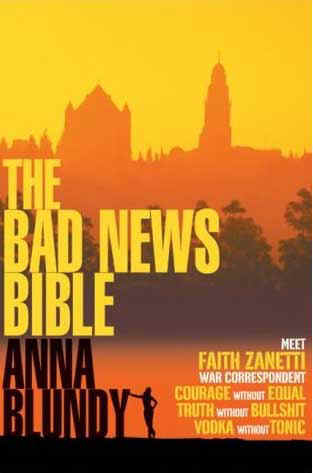

|

|
Anna Blundy is the author of semi-autobiographical novels featuring Faith Zanetti, “a war correspondent addicted to danger, alcohol and cigarettes but clever enough to know that at some point something's got to give.” Faith made her debut covering Jerusalem in The Bad News Bible (2004), and moved to war-torn Baghdad in Faith Without Doubt (2005). In Neat Vodka (September 2006) Faith returns to Moscow – where fifteen years earlier she was a teenage bride to a charming black marketeer – and promptly finds herself arrested for a murder committed in her flat all those years ago. She was drunk at the time but surely not that drunk? Now she has to sort out her past as well as her present. Neat Vodka reads as if it could be Anna’s most autobiographical novel to date: like Faith, Anna lived in Russia as the Moscow correspondent for a newspaper (in Anna’s case The Times). And on her website she says that when she was fifteen she, "fell in love with Communist Russia and a black marketeer I met on Red Square" – very similar to how Faith meets Dimitri, the man who turns out to be the cause of Faith’s woes in Moscow. I ask Anna how much of the story is based on her own experiences. “It is almost entirely autobiographical, except that I never murdered anyone,” Anna says in a rapid-fire style of speaking you’d imagine from Faith Zanetti. “Someone was murdered in the room next door to me in this communal apartment, and I did (like Faith) keep frozen chickens between the double glazing and the landlady did keep on stealing them. Pretty much all the conversations are ones I’ve had. The real grown-up Dimitri, he’s called Sergei in real life, is nothing like the one in Neat Vodka though. The goose hunting in the Arctic north is true too, but not the murder, obviously. I suppose I’ve mixed it up a bit, because Tina’s boyfriend is an ex-boyfriend of mine – in the story I called him Job, and he’s from Cameroon. The other person who’s completely real is Adrian (my old friend Kevin) – he really did disappear into the Russian wilderness. He had no documentation to prove he was American, and his identity was based on forged Russian papers. The prison is real as well – the Russian equivalent of Broadmoor, and they do breed coypus there.” As Anna’s checklist of autographical points suggests, there is no shortage of action in Neat Vodka, where Faith rushes from the streets of Moscow to the nightmarish Oryol psychiatric prison in search of her missing husband, to a crazed trip in a tank across the frozen tundra of Vorkuta. And amongst these surreal events are large sprinklings of humour. “Not all of it’s my humour. I’ve just come back from Southern Russia, and that’s how Russians talk.” But, Anna admits, the difficulty of translation probably means that some of her own humour sneaks in by accident. “On the trip I’ve just got back from, I was shown around a French factory and I was simultaneously translating with French, Russian and English, so I’m pretty sure that the tone is heavily dictated by me. Translation is so ambiguous. For example, in Moscow they had an advert for Sprite where the English had been, ‘More a can of drink than a way of life’ which got translated as ‘More a jar of water than a way to live’.” The Sprite mistranslation is one of many real-life insights into post-Communist Russia that finds their way into Neat Vodka. One of the pleasures of reading Neat Vodka is getting all the telling details of contemporary Russian life, told through the eyes of a foreign correspondent. I ask Anna if there are any news items that affected the genesis of the story. “I’d be going to Russia for a huge amount of time, so in terms of outside events it was the other way round, the events affecting my life. In a sense Gorbachev wrote the novel. I interviewed him once on the radio – in Russian – and we had cognac together afterwards. It was the most star-struck I’ve ever been.” I wonder whether Faith would be star-struck talking to Gorbachev. Not judging by the mock “interview with Faith Zanetti” on www.faithzanetti.com, where Faith is a whirlwind of energy and Anna Blundy the interviewer is overawed by her own creation. “No,” Anna corrects me. “The interviewer is the fictional character, not Faith! In terms of personality, Faith’s a bit more like I used to be. She’s quite insecure and emotionally unaware. I have two kids, they’re six and eight, and I’ve grown up more than Faith has. That’s partly a publishing thing – I’ve tried to make Faith older and bleaker, and not been allowed.” Left to her own devices, Anna explains, “I tend to go bleaker. In The Bad News Bible, there were lots of children. I wanted to kill a child and its mother, but my publishers wouldn’t let me.” And even the worst characters, according to Anna’s publisher, “have to have one nice thing about them. For example, Scarlet O’Hara loved her mother.” So, in striving to keep the Zanetti novels light and upbeat, are Anna’s publishers pitching the Faith Zanetti series at Cosmo readers? After all, Helen Fielding’s Bridget Jones was partially based on the love-life confessional newspaper columns that Anna and Zoe Heller were writing around the same time. “I hope so! I’m happy to be pitched that way. I haven’t had an idea recently that I’m totally married to – I respect my publisher’s opinion. You’re writing for people’s entertainment. I don’t want to write a book that’s hugely literary if nobody wants to read it; I want to entertain people. But I hate to think that I’m writing just for women. Don [a reformed alcoholic photographer] is very blokey, and the women in that business have to become macho to survive. Because Faith’s so tough, men are frightened of her. I think that people with very strong personalities can’t always be blamed for the effects they have on other people.” Don is a rather comic character – a war-jaded alcoholic photographer who, to Faith’s astonishment, has given up the bottle, married, bought a house in the suburbs of Moscow and become an attentive dad to baby ‘Donchik’. I ask Anna whether there was an element of wish fulfilment here, since Anna’s own father (the investigative journalist David Blundy) was always away from home, chasing the next news story in one foreign country after another. “No – I only did that because I thought it would be funny. Don is a buffoon.” And indeed there is a lot of comedy to be extracted from Don’s dramatic return to form, much to his wife’s horror. David Blundy was shot and killed in San Salvador in 1989, an obviously painful subject that Anna faced in her first book Every Time We Say Goodbye, in which she describes her journey to discover what happened to her father. I ask her whether the comic edge to the Faith Zanetti novels is a kind of gallows humour, a defence mechanism against her awareness of the horrors of war – and whether there was perhaps some therapy in giving a rifle to Faith in the dramatic climax scene of Neat Vodka so that she can defend Eden Jones, the man she loves. “Yes; Eden is like my dad. However, Clive Owen’s child is at my son’s school and I think Eden should look like him. I’m much less convincing with male characters. They tend to end up more composite.” I ask Anna where the name Faith Zanetti came from, and she says that Faith is one of the names she was considering for her daughter, who’s actually called Hope. “I like names with significance,” she adds. “Zanetti is my mother-in-law’s maiden name. I was nervous of Faith sounding too Englishy. She’s British, but I didn’t want her to sound white and middle class or even white and working class. Zanetti is written on coffee cups, because it’s a company that makes crockery. The ‘Z’ makes it more ambiguous, not typically Italian.” And Faith’s looks? Her blonde afro is pretty unusual. “That wasn’t as conscious as the name. I think she has green eyes. She doesn’t fit in and she doesn’t really live anywhere. A clear racial, cultural background would make her more boring.” Faith’s certainly not boring. Will Faith ever get retired, I ask Anna, or will she at least settle down? Perhaps move to Italy, where Anna and her family are now living? “Right now, in this next Faith book I’m supposed to writing,” Anna replies, “Eden Jones is living in my house in Italy, making jam. Nearly half of my time is spent there. Our family home is in Italy, in Northern Tuscany.” And since Anna has a five-book deal over five years, we can expect further adventures from Faith, even after her Italian sojourn.
|

| Page By Gary Cane [Contact] | ||
| Webmaster: Tony 'Grog' Roberts [Contact] |